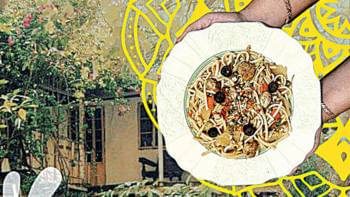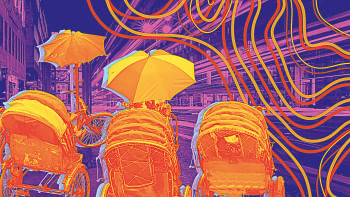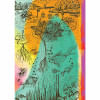Miles away

Velutha is not sure whether he should be listening to the passengers debating over the clothes being purchased now. The man in khaki shorts and a tank top is suggesting that they hit more shops before they put a stop to their shopping spree. However, the wife (as Velutha presumes) wants instead to explore the restaurants draped in tinted glasses that work only to obscure the view from outside.
Velutha rewinds his own memories of crossing these high-end eating places a million times over and his wondrous thoughts always land on the idea that these places are for people entirely different from him. To even look through the glass, he needs to belong to a classified group that reeks of importance and riches.
But things like that do not bother Velutha at all. Not being able to peek through a barricaded glass wall is the least of his problems. Why should it be? The idea surrounding barricaded glass walls and these walls' ghettoised gatekeeping has hardened him through years of rejection and stares of scrutiny.
"Stop the car here. You need to drop us here, near the Clarrise Classics." The woman says.
"Of course, these places are jammed with taxis and Uber. You won't have problems finding cars here, ma'am." utters Velutha.
"What! Oh…Yes. Sure, here you go." The woman hands the money to Velutha. Both the husband and wife descend into the place that is the right fit for their kind, Velutha thinks.
The clock proudly shows 11:35 at night, and Velutha can very clearly hear his stomach growling, but the thought of eating a burger and some meagre overly salted fries snatches the hunger out of him. However, his distaste for the food does not linger for long, as its association with something sacred and as a part of entertainment has left him since he stepped into this country.
He parks his car behind the neon-lit sign of the burger shop, which says 'Burgers and Fries', and sits in his usual seat. The waiter comes and gives him an ever-so-friendly nod, which Velutha cherishes, as these glances of appreciation appear only once in a blue moon. It is not that Velutha craves these appreciative glances, it is just that he misses the water-glazed eyes and mirth-ridden familiar faces of his family. Here, he compensates for the loving familiarity of his friends or family with half-hearted glances.
"The usual?" asks Kai, the waiter.
"You know it", Velutha replies with a half-excited face.
Just within 15 minutes of ordering, the food is in front of Velutha. However, it does not invoke the child-like greedy sensation that he used to get back home. He misses the accumulation of sharp fragrant garlic and ginger paste circulating the air which hit his nose before the flavour of food reached the mouth. He also misses the eye-widening view of food he used to be all too familiar with back home, which Ma, from the treasure trove of her kitchen, would bring out one by one.
Among all the foods Velutha's Ma made, she made Shutki Bhorta so appetising that it was a crime against the Gods and Goddesses of food to not finish a whole plate of bhat with it. The whole cloves of garlic and the red pepper played hide and seek with the mushy meatiness of the dried fish bits. It is all too familiar to Velutha. Velutha used to fill his heart and stomach with it, and Ma would scold him for not being able to reach the main courses that contained more adventures in food.
Back at home, food used to narrate stories. Here, food does not travel far to the nooks and crannies of Velutha's heart; it only reaches his stomach well enough to leave him looking healthy and strong. Velutha can go to places that sell desi food, but he does not want to erase from his mind the remaining memories of his Ma's home-cooked food, for he wants his Ma's magic to monopolise and reign in the centripetal crevices of his mind.
He eats his dinner with much less enthusiasm than before, pays his dues, and gets up to go back to his car, but Kai stops him midway.
"Velutha, you may know him; I presume he is from your country. I don't want you to miss the opportunity to talk to someone who is your countryman. Do you think you know him?" Kai asks with wonder.
The callousness with which people sometimes draw their conclusions baffles Velutha every time. What does Kai think? That Velutha knows everyone if they're from his country?
"It's not a club, Kai", Velutha says in an impassive tone while making his way to the supposed man from his country.
Velutha can simply go to his car and drive to the hostel to get the much-needed sleep so he would not be weary for tomorrow's shift, but "the man from his country" does invoke in him an itch to know more about that.
So, he stays. He stays not out of the goodness of his heart, rather, the selfish reason of conversing with a fellow countryman and to engage in colloquial connection and perhaps a brotherhood.
Velutha thinks about what he will even talk about with this man. It is hard for him as his natural ability in native speech has weakened—just like how a person forgets a once-mastered craft and struggles to gather the basics all over again; the potential to excel is there, but the years of avoidance have caused a lapse in mastery. And for Velutha, it is the lack of meaningful conversation in years that has caused him to almost forget his own tongue.
So, his thoughts start circling around himself like eagles encircling a food source. After enough thinking, Velutha walks over to the man and notices something strange about the way the man's shoulder is quivering and shivering—it is indicative of the fact that the man is weeping.
Velutha is not sure whether he should pry at such an intimate time, but his mouth has spoken before his mind had the opportunity to decide against this action.
"Hey, are you okay?" Velutha says as he takes a seat across from the man in distress.
The man across from Velutha reacts as if someone just caught him in the act of doing something illegal and gets startled. He then looks at Velutha with a known regularity that almost makes Velutha feel safe to talk to him.
After the initial introductions, Velutha comes to know that the man is indeed Velutha's countryman which, unknowingly, fills his heart with excitement. As for the sad part, Velutha also learns that the man in front of him just received the heart-wrenching news of his mother's demise.
This man, whose name Velutha got to know as Nathir explains to Velutha how he was on his shift at the supermarket when the call of doom came. His father only said, "your mother died two hours ago, and I don't want you to worry as we are taking care of everything".
Nathir was not sure whether it was the calmness with which his father delivered the catastrophic news or the impassiveness in himself that had matured in him over the eight years of being far away from his family in a foreign land that caused Nathir to put the phone back in his pocket after the call ended and go back to doing his work with the same half-hearted eagerness as every other day.
People may confuse his 'handling of emotions' as insincere, but the truth is that Nathir doesn't know how to feel or regulate emotions. Being apart from his family for eight long years has made him think of his family as solely a concept that lives in his mind—a concept that only resides in the things of the past. It is as if the physical tangibility of family has transformed into a mere concept since the day he left for this foreign land. The more time goes by, the more the physical attributes of his family disappear from his mind.
It is like a gyre that has kept on spinning since he left home, and the gyre thus keeps on widening, and so does Nathir's distance from his family. It is like this concept is stored in the poignant part of his brain and whenever he feels the urge to be with family, this concept's memories fall into the hollow places of his mind, thus sustaining him.
This may be the reason why he did not shed a tear the whole day until now. However, it is the scene of a mother with her son in this very restaurant that burned in Nathir's heart like wildfire and then the cloud of tears that had been hoarding up drops of moisture year after year for almost eight years finally succumbed and evaporated, and Nathir sobbed.
Nathir sobbed as if the place was empty. He did not care who looked at him funny or who judged him for crying. He cried for his mother. He cried to bridge the 8000 miles of distance between him and his mother. He cried to calm the dull ache in his heart.
He cried for his mother and the selfless love she bestowed on the inconsiderate passive menagerie of a family that drained her soul day after day.
He almost feels angry towards his family for the demise of his mother. The years of the family's unwavering demands and the loaded lacerations on her mind have finally weighed her down at last. Maybe the final straw was just the phoney unappreciative glances they threw at her that kept on cornering her in the 70-square-foot rectangular cell called the kitchen, where her family's desires or aspirations were always ablaze. But as for Nathir's mother, her flames only went out, just like the cessation of flame after every cooking session. It is as if they cruelly bid their mother for food on the table.
Velutha also learns how Nathir cannot really go to the janazah of his mother as his lack of money comes between the familial bond. All he can do now is weep in front of a stranger in a strange land that does not accept him.
The 'not having money' part is not surprising, as he has not been able to climb the social ladder since the day he started working here. So, it is more than understandable why he wouldn't be able to go to see his mother for the last time.
This was the last thing Nathir and Velutha talked about. After that, they got separated, probably to live their lives antithetical to what they imagined life to be.
Velutha keeps thinking about this encounter on the drive back to the hostel. He reflects on how he bade his goodbye to Nathir with words of empathy and assurance that everything will be alright.
But Velutha knows it is far from true, and he knows how Nathir will probably go on living with a mountain-sized hole in his heart, beating himself up every day, wondering why he couldn't have had the money for the plane ticket that could have delivered him to his mother?
"Everything, at last, succumbs to the monetary monstrosity", Velutha thinks to himself. Velutha also wonders whether they will ever meet again and whether they can find the brotherhood. Probably not. Probably they will go on living as before.
***
When the next morning comes, it comes like a rush and Nathir wakes up from his 30-minute sleep to his father's phone, asking for money for the gathering of relatives and neighbours in memory of Nathir's mother's demise. Nathir says he will take care of it.
However, his father does not forget to mention that they need to marry off Nathir's sister too as soon as possible. Nathir hangs up the phone quickly after that. He hangs up because he doesn't know how passive his father must be to mention mourning and marriage in the same breath.
After some time, he gets dressed for work. In the supermarket, he goes back to work chores like a piece fitting a puzzle. He stocks the cereal, ready-made salads, and freshly squeezed orange juice. He rearranges the disorganised items on the shelves. He cleans the dust off the groceries.
No one can even guess that this man working in the market has just lost his mother merely 27 hours ago. It is not like the world has grown a mother-sized void on its surface for Nilufa, so it can care less about such discrepancy.
Nilufa! This was Nathir's mother's beautiful name. It means lotus flower. But what good did this name do to Nathir's mother anyway? No one used it to address her. Some called her by her husband's surname and some called her by her son's name, as in "Nathir's ma". So, naturally, her name was abandoned and disregarded fully. Her name disappeared just like she disappeared from this world, without a trace.
***
On the same day, on the other side of the city, Velutha is busy helping passengers carry their belongings in the car. Once Velutha gives a once-over of everyone's comfort and position, he starts driving for the gala night at 4th Avenue as per the instructed destination of the passengers.
He never means to pry on passengers, but he can hear the passengers talking about the latest trendy artist's performance at the gala they are going to and how the ticket, according to them, is not as expensive as they thought it was going to be because 270 dollars for a ticket "is pretty reasonable".
Velutha keeps his eyes on the road, not to take a wrong turn while crossing the endless street. As the streetlights pass, their reflection illuminates his face every other second.
The trees keep on passing in bulk in his peripheral view. "270 dollars probably could have gotten Nathir a plane ticket home", he thinks to himself. His thoughts are racing at the same pace as the traffic lights, and soon, his car descends into the night.
Afnan Bintey Helal is a recent graduate in English Literature and Linguistics from East West University.

 For all latest news, follow The Daily Star's Google News channel.
For all latest news, follow The Daily Star's Google News channel. 










Comments